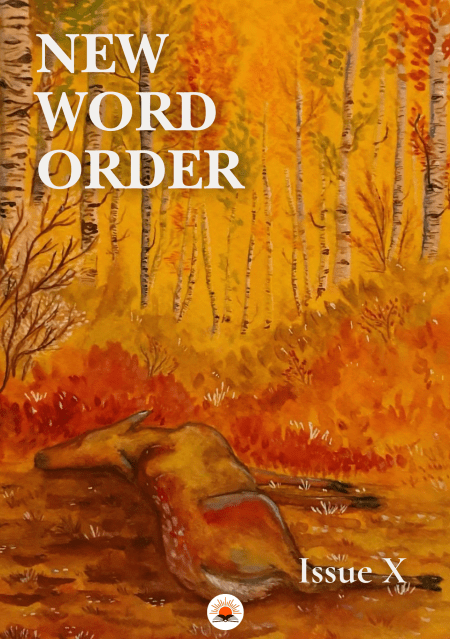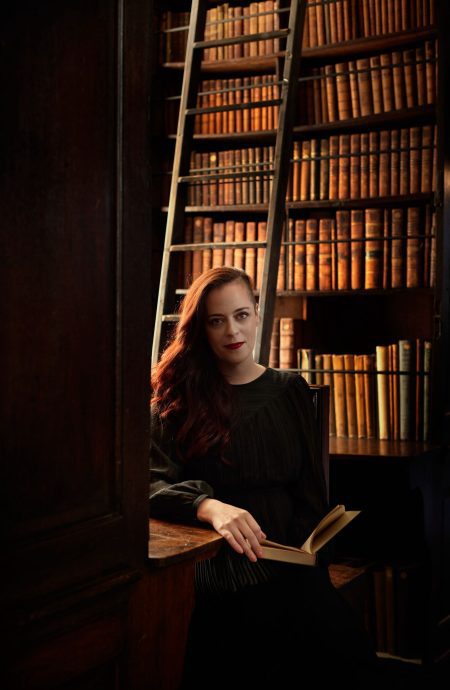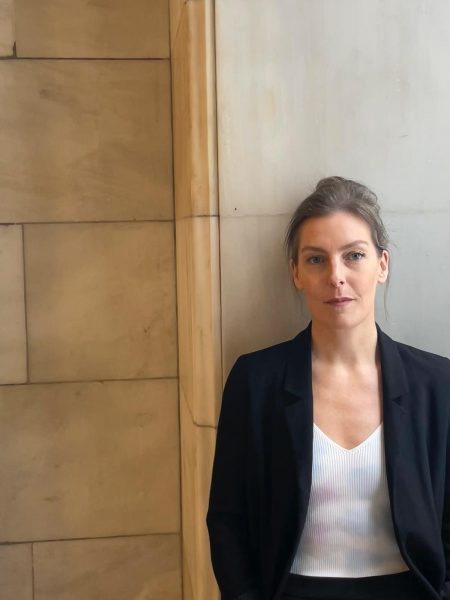By Elaine Gormley
Photo “Burnt Out” By Eoin Campbell
The day I planned on coming out to Ma, was the day she found out she had cancer. The doctors gave her six months. She lasted seven to spite them.
Da handed me a roll of black bin bags.
‘Thanks, love.’ He rubbed the end of his red nose and sunk back into his armchair. He barely moved from it since the funeral.
Ma and Da never shared a room. I paid no mind, ‘til I was older. I shook the bin bag out and opened Ma’s wardrobe. I used to hide in it when I was a kid, when the British Army helicopter was out. She’d join me and close the doors. Her collection of flares, miniskirts and shell suits would help drown out the sound.
It didn’t seem right to be clearing her stuff out, but if I didn’t, Nuala would, and Ma couldn’t stick her. Before she died, Ma said to me, ‘Don’t let her near my stuff. She’s as nosey as they come. You’d think she’d be more like your father with them being twins.’ I pulled each item off its hanger and let it drop into the bag below. All except one. I wrapped her leather jacket around me, hoping it would squeeze some of the loss from my limbs. It didn’t.
I stood in front of the mirror. Reflected back at me were memories of her final days. ‘When the time comes, you keep that jacket. It suits you,’ she said. ‘I bought it because it made me look like Bernadette Devlin.’
I closed my eyes and slipped my hand into my pockets and begged God, in her compassion to distract me. She did.
A wad of an envelope filled my right hand. I struggled to pull it from the pocket. It was as if it didn’t want to be disturbed. It was Ma’s writing. Addressed to a Ms. Josephine Mellon. Sealed and stamped, ready to make its way to the Malone Road in Belfast. Fancy.
The envelope was powder blue and the stamp wasn’t the standard one with the Queen of England. This was a special stamp. Ma was particular that way. Two yellow wagtail birds perched on the same branch but looking in different directions. I ran my fingers across the triangular flap and thought of Ma bringing it to her mouth. I pressed it to my face. The seal of the envelope popped open, giving me a wee kiss.
I suddenly had a memory of her back in ‘87, writing thank-you cards, sealing envelopes, licking stamps, and humming to Johnny Logan’s Eurovision entry, playing on the radio. I watched from the floor, surrounded by homemade tricolour flags and bunting, made for our party that evening. It was nice having that image of her. Since her wake, all I could think of was her in the coffin. Lips sewed up too tight and no make-up. That wasn’t Ma.
I hopped into her bed, and gathered the blankets around me. My heart was going ninety. I thought I’d never remember the way she used to be. I held the envelope, grateful for the memory it brought back. I could smell Ma’s perfume off the quilt. Patchouli. She was such a hippy.
I looked at the envelope. It wasn’t mine to read. But sure who would know? What harm could it do?
My conscience didn’t prick me as much as my curiosity. Before I changed my mind, I pulled out the letter and started to read. The top right-hand corner had our full address, and below it, Ma had written the date. 1st January 1981. I was born ten days later.
My dearest Jo,
I hope and pray you’ve made it this far and resisted every rightful urge you might have to dispose of this letter. I hope you haven’t, and that it rests in your hands right now. Please read on, even though my inadequate words don’t deserve your attention.
I attempted to write this letter several times over the last nine months, each time giving up at the hard bit. That’ll be no surprise to you, I’m sure. I always was a coward, always taking the easy way out. But this only brings me short-term relief. I’m left with the loss of my poor decisions and tolerate my regret as best I can. I’m not looking for sympathy. You deserve it, not me. I don’t think you fully believed how heartbroken I was when I walked away. I still am.
I’m pregnant. There, I’ve said it. She’s due in a few days. I say she, but, of course, I don’t know. I’ve been saying ‘she’ all along, hoping she will be a girl and not a boy. That’s awful isn’t it? I know I’ll love it no matter what.
I think of you all the time.
Every time I turn on the news, and hear of a bomb or shooting in Belfast, my heart stops for a moment and I pray you’re safe. Then I think of us walking through the rabble of bigots outside City Hall. Do you remember? I froze among the placards. You realised I wasn’t behind you and turned back. Plowing through the crowd of old men, you, in your denim jacket and jeans with your newly cut fringe, coming up a little too short. You shouldered and elbowed your way to me, then grabbed my hand and pulled me through. You spat wonderful profanities along the way. I’d never heard a girl speak like that before. Then, we stopped and looked back at the crowd. He didn’t need a microphone but used it anyway, and when you heard him boom “Save Ulster from sodomy,” you roared back, “Sodomy will save Ulster and Ireland.” The memory still makes me laugh. We sprinted all the way past City Hall, up Bedford Street, and didn’t stop until we reached the Dublin Road.
We went into a charity shop, and you headed straight to the men’s rails and picked up a white shirt and black tie, saying you wanted to look like Patti Smith. You reminded me of Kate Bush, but I stopped saying it because I knew you didn’t like it.
You were the most beautiful woman I’d ever seen.
We walked to your aunt’s house on the Malone Road. I’m guessing you still live there. Well, you did a year ago.
I loved that house. We raced up to your room in the attic and you pushed me down on the bed and told me to close my eyes and listen. Your long dark hair tickled my cheek and made me smile. I could hear you make your way over to the turntable in the corner of your room. Then the music started.
“Jesus died for somebody’s sins, but not mine.”
I lost my virginity several times to that record. Every time with you.
Everything worth doing, I did for the first time with you. Until now. It didn’t seem right not to tell you about the baby.
One month later.
Classes were canceled due to the snow. I only found this out once I’d made the fifty-mile bus trip to Belfast. Since I’d read the letter, I couldn’t stop thinking about it. I had so many questions. Questions I might never get answers to. The next bus wasn’t for another three hours, so I decided to dander up the Malone road. Just for a look.
It was a red brick three-storey house. The snow lay undisturbed on the steps that led to the front door. The gate creaked when I pushed it open. I’d no idea what I was doing. No plan. No intention. Was I wise? I thought. The envelope was still in my pocket.
I made my way up the steps to the green font door. A round brass doorbell was fixed to the right of it and said press. I did.
A woman with thick dark hair, pulled into a messy bun, swung open the door. The sound of barking dogs bellowed out.
‘Hiya.’ she popped her head outside. ‘Still snowing I see.’
She smiled at me warmly. Her make-up was immaculate and her lips were painted bright red. She wore an oversized shirt with tan cigarette trousers and a chunky pendant with a green semi-precious stone dangled around her neck.
‘You’re early. Wasn’t expecting you for another half an hour.’
‘What? Sorry, I don’t know what you mean,’ I said.
She pointed to the bay window to her left. A sign was stuck to it. Room for rent. ‘You’re not the girl that rang me this morning then?’
‘No.’ I bit my lip.
‘Well, what I said to her, I’ll say to you. First come first served.’ The dogs continued barking. ‘Do you like dogs?’
I nodded.
‘Good. I have two. Come with me.’ She turned her back and I followed her into the house, pressing the door closed behind me.
‘It’s feeding time at the zoo. If you give me a minute, I’ll show you around.’
She made her way down the hallway and opened a door into the kitchen. Two Border Collies just like the ones we had on the farm, burst past her, circled and sniffed me, then ran back to her.
The hall looked class. William Morris wallpaper lined its walls. Ma always liked his stuff. Loads of framed pictures were hanging from the picture rail above them, and the red carpet on the stairs had become worn down the centre but still looked impressive.
Just inside the door was an old rectangular mahogany hall table, cluttered with picture frames, posts, and a pot of pink hyacinth. The smell hit me as I passed it.
In the kitchen, three cats had their heads buried in bowls of food. Two larger empty bowls lay at the other side of the room. The younger of the two collies, approached me again while the woman was bent over the deep sink, filling a bowl full of water and moving to the music playing on the radio.
‘Did you have your breakfast, Pup?’ I asked the dog.
The woman looked over her shoulder, and smiled. ‘Have to feed them first. Top dog and all that.’ Then she whispered. ‘But we all know the truth.’ She raised her hand and made three indents in the air from top to bottom. ‘It’s cats, then dogs, then us. Well, that’s the truth. The reality is taking some time to catch up. My aunt, God rest her soul, used to say to treat dogs like men. Let them think they come first in the pecking order and they’ll be putty in your hands.’
I laughed and thought of Ma pacifying Da when he would be giving off about something. She’d nod and agree and soon he would be soothed and silent like a baby, and unable to refuse anything she asked for.
The dog licked my fingers.
‘She likes you.’
‘She can probably taste the butter from my hands. I had a scone before I came here,’ I said.
‘Umm. Lovely.’ She placed the bowl of water on the floor, then stood and looked at me inquisitively. ‘So, you’re a student I presume? Queen’s?’
I tried to clear the lump in my throat. ‘Yeah. It’s my first year.’
She tilted her head and looked more closely at me. I shuffled from one foot to the other.
‘I lecture there sometimes. Maybe that’s why you look familiar. What are you studying?’
One of her cats made its way over to me and stretched its body into my leg. ‘Sociology and Women’s Studies.’
‘Ah!’ She raised her hands in the air. ‘That must be it. I’ve done a talk or two for the course coordinator on Feminism and Republicanism. My lecture on the formation of Cumann na mBan had an impressive turnout if I do say so myself.’
‘You’re a lecturer then?’
‘I call myself a professional agitator. I write, report, and teach.’ She grabbed a tea towel from the worktop and rubbed her hands in it. ‘Not always the voice of popular opinion but I know my stuff, so most of the old dinosaurs here tend not to challenge me to a debate.’
I started to pull the envelope from my pocket, then stopped as she moved past me. ‘Enough about me, let me show you the room.’
She talked and I followed. She glided up the three flights of stairs while I was breathless after the first one. When she opened the door I half expected to see the record player in the corner. There wasn’t one. The room was warm and bright, catching the morning sun. She lifted a sheet of paper from a small dressing table and handed it to me.
‘That’s the tenancy agreement.’
I looked at the flimsy piece of paper.
‘You’ll see the rent is very reasonable and includes all utilities too. You’ll also see there’s no morality bullshit in there either. You don’t mind if I curse do you?’
I shook my head. ‘No, work away.’
‘Good. Because I curse A LOT.’
‘Why’s the rent so cheap?’
‘It’s my protest against the bourgeoisie. Greedy bastards. And now you kids don’t even get a grant. Student loans for an education. It’s a fucking disgrace. Let’s make third-level education for the elite again, shall we?’ She paced up and down the room. ‘Oh, don’t get me started.’
I laughed. ‘I agree with you.’
She stopped pacing, relaxed her shoulders and smiled. ‘I like you. I think we might actually get along. The dogs seem to like you too, which is the main thing.’ She tapped the agreement I was holding. ‘Just pay your rent and no noise after nine. You can certainly bring back who you like, just no parties please.’ She raised her finger in the air. ‘Oh, and water the plants on occasions and feed the menagerie of furries the odd time for me.’
She let me walk ahead of her on the way down. At the bottom of the stairs, the younger dog came over to me again, and I bent down to stroke her. ‘What’s she called?’
‘Pol. Short for Polly. Came with the name, so wasn’t fair to change it. The other is also a rescue. She’s called Coco.’
One of the cats came towards us. The woman picked her up and rubbed her knuckles into its forehead. ‘This is Constance, the oldest of the three cats. The other two are sisters, Maud and Grace.’
We looked at each other and smiled. ‘Good names,’ I said, thinking of the powerful Irish women they were clearly named after.
‘And I’m Jo by the way. Josephine Mellon. You didn’t tell me yours.’
I stroked the dog, hoping it would calm me down. ‘My name is also Josephine.’ ‘Really?’
‘But most people call me Josie. Well, that’s what my da calls me.’
‘What do you prefer?’
‘I suppose what my ma called me. Just Josephine.’
I reached into my pocket. My hand trembled as I began to pull the letter out, but then the doorbell rang.
Jo spun around. ‘This must be the next girl,’ she said. The dogs went nuts, so she shooed them back to the kitchen.
As she walked past me, she started singing a famous Eurovision entry. ‘But soon you will find that there comes a time, for making your mind up.’
The doorbell rang again and she opened it. It was the postman. He handed her a parcel and a few letters and she thanked him and watched him make his way down the steps.
‘I better get out of your way,’ I said. I buttoned up my jacket.
‘What do you think then?’ she asked.
‘Umm, I don’t think I can.’ My voice was shaking.
Jo looked disappointed, but mustered a smile. ‘Not to your liking?’
My throat was dry and my fingers fidgeted with the envelope in my pocket. I licked my lips to refresh my words. ‘My ma died.’ I looked to the floor. ‘A few months ago.’
I felt her gentle grasp on my shoulder. ‘God love you, pet. I’m sorry to hear that.’ I looked at her concerned face and pangs of guilt stabbed my broken heart.
‘I just, I just think it’s a bit too soon to leave Da. I’m sorry for wasting your time.’ I moved towards the front door. ‘Thanks for showing me around. You’ve a nice house.’
Jo reached to the door latch. ‘It was lovely to meet you, Josephine. Don’t be afraid to come back to me next year if you feel ready to move out. I might have a room going spare.’
‘Aye, I might just do that,’ I said.
Jo closed the door behind me, and I heard her call to the dogs in the kitchen who had started to bark again.
I felt like shite. Ma would say it would serve me right for snooping. The thought of disappointing her, even after her death was too much to bear. I didn’t have the heart to hold onto what wasn’t mine. I took the letter from my pocket. Its words were not for me. I had my own things to say and needed to find the courage to speak them.
I released my mother’s secrets. I had enough of my own. I slipped the letter through the letterbox and walked towards the bus station, steadily making my way back home to Da.
Elaine Gormley
Elaine Gormley is a new writer from Armagh, but now lives in Belfast. From a young age, Elaine had a keen interest in writing and performing. Having received a BA in Drama and Film Studies at Queen’s University, she went on to study for a degree in Counselling at the University of Ulster. Elaine’s writing reflects both the humour and drama of working-class people living in the North of Ireland. Most recently she has had a short story published by Apricot Press.



